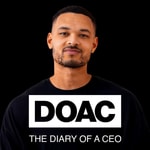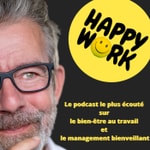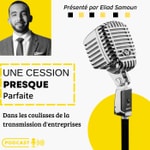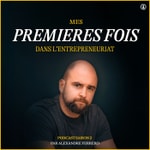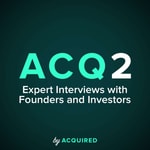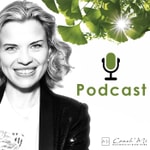Eat Sleep Work Repeat - better workplace culture – Détails, épisodes et analyse
Détails du podcast
Informations techniques et générales issues du flux RSS du podcast.

Eat Sleep Work Repeat - better workplace culture
brucedaisley.com
Fréquence : 1 épisode/15j. Total Éps: 206

MAKE WORK BETTER. Eat Sleep Work Repeat is the best podcast about workplace culture - it's been listened to millions of times.
Bruce Daisley brings a curious mind to discussions about our jobs and the role they play in our lives.
Hosted on Acast. See acast.com/privacy for more information.
Classements récents
Dernières positions dans les classements Apple Podcasts et Spotify.
Apple Podcasts
Aucun classement récent disponible
Spotify
Aucun classement récent disponible
Liens partagés entre épisodes et podcasts
Liens présents dans les descriptions d'épisodes et autres podcasts les utilisant également.
See all- https://www.ai-mindset.ai/
524 partages
- https://seths.blog/
215 partages
- https://makeworkbetter.substack.com/
123 partages
- https://www.linkedin.com/feed/#
1653 partages
- https://twitter.com/MGawdat
543 partages
- https://twitter.com/rorysutherland
37 partages
- https://twitter.com/EllenCScott
30 partages
Qualité et score du flux RSS
Évaluation technique de la qualité et de la structure du flux RSS.
See allScore global : 49%
Historique des publications
Répartition mensuelle des publications d'épisodes au fil des années.
How Octopus Energy used culture to reach the top
Saison 12 · Épisode 208
mercredi 30 juillet 2025 • Durée 35:46
I’m often asked asked which company cultures I admire, especially as I tend to be critical of the culture inside tech firms. It’s easy to have good vibes in small firms but organisations who manage to deliver good culture at scale are the ones I’m most interested in. I often call out Nando’s or Octopus Energy.
I was delighted to get the chance to talk to the CEO of Octopus Energy Group, Greg Jackson. I’ve often reflected that the best cultures seem to be codified and made explicit, but Octopus’s culture isn’t really defined by formal values, Jackson doesn’t pin it down to three or four words. Instead the culture has a vivid feeling but is loosely articulated, a tangible mix of trust, autonomy and a shared mission.
Cultures are often defined by what they’re against as much as what they are for. Many companies give a laundry list of desirable attributes they strive for. There’s an organisation at the end of my street that has ‘excellence’ and ‘respect’ on its windows, but would any business claim to be built on mediocrity or disrespect? Aren’t they just given? Sometimes these things are called the Pillars of Character. Yes, we have integrity here, but how does that help you work here?
For businesses these pillars are useless for creating differentiation. Jackson’s approach at Octopus stands apart from that, he takes issue with common norms elsewhere. Researching for the conversation I listened to one interview where Jackson talked about the absence of back-to-back meetings in his day. He said:
First of one thing I do that I think is unusual is I don't pack my day with meetings. I'm religious about having lots of time outside meetings because in the one hour that someone wants to have a meeting, I can make 10 phone calls or I could drop by the desks of half a dozen team members and I can be available for people to deal with what's going on that day. So one thing for me is your time is far too precious to let it get soaked up on other people's meeting requests. It's quite funny when I got a new PA, she came from a very large software company and I said, ‘I've got a lot of meetings tomorrow’. And she said, well, where I used to work, my job was to pack from 8 AM to 5 PM every day, hour by hour by hour. And I was like, Whoa, how does that person get any thinking time? How does it get any, any time to reset? And how does it get to do anything proactive that changes the world?After the conversation, which was recorded live on stage near Guildford, someone came up to me. ‘My son works at Octopus,’ he said. Here we go, I thought. ‘Every single word he said up there is true. He says he wishes he’d joined there years ago’.
Links:
Greg on High Performance podcast
Take a listen, I’d love to hear your thoughts.
Hosted on Acast. See acast.com/privacy for more information.
Getting to grips with workplace AI
Saison 12 · Épisode 207
vendredi 6 juin 2025 • Durée 42:04
This is the second episode this month about AI and the implications for our jobs.
Two weeks ago I went along to a huge event run by Workday down in North Greenwich. Workday, their partners and their customers took to the stage to talk about applications of AI that are coming to their platform. As part of the event I was able to run a discussion with a couple of voices from the company who are helping businesses navigate the challenges that AI presents to us.
I was joined by Jerry Ting. Jerry is the founder of Evisort and now teaches at Harvard Law School and is a senior leader at Workday. And the other contributor was Angelique de Vries Schipperijn, she's the EMEA president for Workday. The conversation was fascinating for me in a few ways, firstly we can be so daunted about what AI represents in our jobs and this seemed simple and easy to understand, but secondly because as I mentioned last week the conversations I got from the audience suggested that there’s a lot of businesses who have barely started their own journeys.
Look, here’s the challenge of the moment, I think the conversation at the event described a future that we have the agency to participate in. It seems real and like something we can connect with, but also everyone who came up to me afterwards anxiously told me that their organisations are doing nothing at all. That’s why I got so much value from this conversation. I think inverted commas “doing AI” feels scary and huge whereas incorporating it into some of the things we’re already going feels possible and easily achievable.
I need to declare that this is a promoted episode in the sense that Workday is a client that I was working with at this event and have worked with before, but critically it was a conversation that I’m delighted to be sharing here.
I want to give a shout out to Hollie Benneyworth at Workday who has worked so hard to make this happen.
You can find a full transcript for this on the website.
Hosted on Acast. See acast.com/privacy for more information.
Outrage in the work chat
Saison 12 · Épisode 198
mardi 26 novembre 2024 • Durée 40:13
Everywhere we look we see someone who is outraged - and plenty of that anger makes its way to the workplace.
The last time President Trump was in power it led to employees becoming more active - who knows if the same will happen in 2025.
Karthik Ramanna talks us through the way to deal with outrage - and the actions that any leader can take to make the workplace a better place. His new book is out now.
More about the Edelman Trust index
Hosted on Acast. See acast.com/privacy for more information.
Community 4: A champion community builder shares her advice
Saison 6 · Épisode 110
lundi 19 octobre 2020 • Durée 49:52
"When I moved to New York City, I realised what it meant to be truly lonely for the first time. I had no consistent community — people who would wonder where I was if I didn’t show up. I was disconnected. At the time, I thought that I was the only one who felt this way… but I was VERY wrong.Turns out, loneliness is a huge issue in the United States. The average American only has one close friend, and 75% of people are not satisfied with their friendships".
Jillian Richardson found that one of the most relatable things that any of us can do is confess to others that we're lonely. Freshly arrived in Manhattan she found the paradox of big cities is that we can be alone while surrounded with others. Her response was to create the Joy List - a list that once set about connecting people across New York with other like minded individuals and now sets about connecting anyone virtually.
The Joy List has become a phenomenon recommended by Esther Perel, Priya Parker and many more. She's also the author of Unlonely Planet.
Jillian gives us her 5 rules of community - and cautions that while communities can exist in the workplace we should be cautious about trying to get everyone into the same community at work. She also talks about her 'Ask' and 'Offer' walls as a device to bring teams together.
Peter Block: "Community requires a concept of the leader as one who creates experiences for others. Experiences that in themselves are examples of our desired future".
If you're thinking I'd love Jillian's help she offers her services professionally both as a course and as personal coaching. If you want to hire her she's willing and able to take that on you can contact her here.
Jillian mentions the Ritual Design Lab.
Hosted on Acast. See acast.com/privacy for more information.
Community 3: How our rituals can forge our culture
Saison 6 · Épisode 109
lundi 12 octobre 2020 • Durée 48:22
We're at part 3 of our series about community at work.
Today's guest is one of the most respected community thinkers in the world, Casper ter Kuile, Fellow at the Harvard Divinity School and author of The Power of Ritual. His book is a practical guide to the way that communities come to life, not only is it practical it's also brilliantly written. I found myself annotating a lot of it and it's impossible not to learn from his wisdom on the topic.
“Disconnection sours the sweet things in life and makes them nearly unbearable”
Casper previously wrote a free book with Angie Thurston is at Harvard Divinity School called How We Gather which was a wonderful exploration of how post religious (secular) groups were creating get togethers that seemed to be inspired by the religious communities that went before them. Casper's perspective is wonderful, so respectful of religion even though he sits outside of it.
This series of episodes has been about understanding how our organisations can shape a sense of belonging in us, especially when we're no longer physically together.
I feel like the episodes are a journey. No one has professed to know the answers and there's plenty of cautionary notes. I'm certain anyone trying to shape community in their work will come away with plenty of thoughts after this. Not least that Casper says that it goes strongly against the spirit of community that someone in a community can fire someone else. Community is built on safety.
In the podcast I also talk about a previous episode on rituals and you can find that here.
Hosted on Acast. See acast.com/privacy for more information.
Community 2: A Community Manager Speaks Truth
Saison 6 · Épisode 108
lundi 5 octobre 2020 • Durée 43:43
Today's episode is a further exploration of how firms will try to evolve their culture by hiring Community Managers. If you've not listened to last week's episode featuring Sarah Drinkwater pull up, back up and tuck in to that one first. Sarah said the person I should talk to is Abadesi Osunsade from Brandwatch - and so that's who we are talking to today. Abadesi's title is VP Global Community & Belonging at the 500 strong organisation.
We talk about seeking to get better at Diversity & Inclusion, giving voice to teams (and applicants) and how to build community in organisations who are no longer together.
Abadesi mentions Square's Rise program. This is the scheme that ensures there's always one minority candidate at the last stage of each hiring process. You'll find more details on it here. (note I couldn't find it on the UK website so maybe stay on the US site when it asks if you want to move).
Here's Abadesi's book and the other organisation she's part of The Hustle Crew.
If you like this please do subscribe to the newsletter.
Image by @claybanks at Unsplash.
Hosted on Acast. See acast.com/privacy for more information.
Community 1: "HR has fallen"
Saison 6 · Épisode 107
mardi 29 septembre 2020 • Durée 30:33
Sign up for the Eat Sleep Work Repeat newsletter here.
New podcast today - the first of four podcasts about what’s next with work - specifically how can we make work feel like a community again, especially when you’re hunkered down under the duvet trying to survive the November chill. Over the next few weeks I’m going to be chatting to some incredible guests.
Today I kick off with Sarah Drinkwater who is a supreme community builder and now works for the Atomico fund.
Some links to what we discuss!
I mention that Gary runs Wonder - this is their website
She mentions Jason Fried's book Rework (my own book
Q Anon - outstanding Reply All when they pretty much work out which crackpot is behind it. Created by a crackpot, weaponised by the GRU.
The Sunrise Movement - love these kids
Image by Shane Rounce on Unsplash
Hosted on Acast. See acast.com/privacy for more information.
Burnout - understanding the other epidemic
Saison 5 · Épisode 106
jeudi 10 septembre 2020 • Durée 42:53
AHP's original article in Buzzfeed
Last year Anne Helen Petersen’s Buzzfeed article about burnout became a viral sensation, spawning a seemingly never-ending wave of ‘Year of Burnout’ headlines. Petersen’s writing triggered such recognition because she rooted it in the ordinary, in everyday experiences that were instantly relatable. She evoked her own life where industrious professional productivity (as a writer) was combined with a weary inability to get things done in her private life.
She initially thought there was something wrong with her. Googling for other people relating their aversion to getting sh!t done domestically, bills sitting unpaid, registrations unfiled, postal votes uncast, chores uncompleted. She realised it wasn’t personal, it was systematic. The way we were living was driving us to a constant feeling of being emotionally & physically spent.
Relatedly, it was sad to read of the passing of David Graeber this week. As an academic he was an unexpected icon of progressive politics but more than anything he was someone who invited us to revisit our preconceived ideas about how society functioned. Graeber had mused in his book ‘Bullshit Jobs’, wondering what had happened to the 15-hour week that in 1930 John Maynard Keynes had predicted by the end of the 20th century. He wondered whether it was indeed possible but societally we might have to reorganise the world of work to achieve it. Insurgent thinking for many, but there are echoes of this conjecture in Petersen’s book. Some of her thoughts might find resonance with frazzled younger workers wondering why they won’t be free of their student loans until 2045 and looking at house prices simmering away at 10 times their salary.
AHP reminds us that despite a whole genre of self-improvement literature that tells us that our personal actions can resolve burnout - or that, come on slouch, you need to be grittier, we need to point the finger at the actions of our firms, not ourselves. Ultimately she suggests that our casual acceptance of the way we’re working is having a toll on our psyche that can’t be easily unspun by productivity hacks and meditation apps. As Taylor Lorenz notes on the jacket, the book “is a compelling exploration of… how an entire generation has been set up to fail”.
Sign up for the Eat Sleep Work Repeat newsletter here.
Hosted on Acast. See acast.com/privacy for more information.
The big return 3: a closer look at data
Saison 5 · Épisode 105
lundi 7 septembre 2020 • Durée 25:55
Today's interviewees: Bhushan Sethi leads PwC's workplace strategy business and Ben Waber is the CEO of workplace analytics firm, Humanyze.
Read the Humanyze research about the way work has changed since lockdown.
Here's the previous episode I recorded with Ben Waber.
Hosted on Acast. See acast.com/privacy for more information.
Gary Hamel: Battling bureaucracy - the big fix for broken work
Saison 5 · Épisode 104
mardi 18 août 2020 • Durée 59:16
I was fortunate to speak to Gary Hamel about his forthcoming new book, Humanocracy.
He believes that the single most empowering (and profitable) thing that businesses can do is eliminate their creeping bureaucracy.
He talks about how increasingly organisations are paralysed with red tape and bureaucracy. The end result is that they can’t get anything done. There are some clear examples of this from the recent past. He characterises the Microsoft era under Bill Gates and Steve Ballmer as being one where opportunity after opportunity was passed because the organisation was so heavily bureaucratic. Satya Nadella has freed the organisation from a lot of this – with evident results.
Hamel proposes a series of questions that help you diagnose the extent of bureaucracy in your company - and you can read more about this here: read more
Buy Gary Hamel's new book, Humanocracy
Hosted on Acast. See acast.com/privacy for more information.
